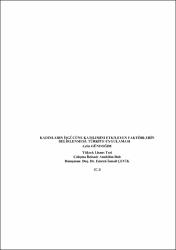| dc.contributor.author | Gündoğdu, Aylin | |
| dc.date.accessioned | 2018-07-31T07:31:01Z | |
| dc.date.available | 2018-07-31T07:31:01Z | |
| dc.date.issued | 2018 | |
| dc.identifier.uri | https://hdl.handle.net/20.500.11776/2920 | |
| dc.description.abstract | Günümüzde refah seviyesinin yükseltilmesi ve kalkınmanın sürdürülebilmesi bakımından kadın istihdamı önemlidir. Ancak kadının işgücüne katılmasını etkileyen birçok faktör vardır. Başlıca faktörler olarak kadınların medeni durumu, eğitim seviyesi, yaşı, çocuk sayısı ve ekonomik koşullar sıralanabilir. Bu çalışmada Türkiye’de kadının işgücüne katılımını etkileyen faktörler incelenmiştir. Bağımsız değişkenler olarak büyüme, enflasyon oranı, işsizlik oranı, doğurganlık oranı ve verimlilik belirlenmiştir. 2005-2017 dönemi için aylık veriler kullanılarak değişkenler arasındaki kısa ve uzun dönem ilişkiler Gecikmesi Dağıtılmış Otoregresif Model (ARDL) yöntemi kullanılarak araştırılmıştır. Çalışmada kullanılan veriler Türkiye İstatistik Kurumu (TÜİK) ve Türkiye Cumhuriyeti Merkez Bankası (TCMB) veri tabanlarından elde edilmiştir. Analiz sonuçlarına göre büyüme ve işsizlik oranı kısa dönemde kadınların işgücüne katılım oranını negatif yönde etkilerken, uzun dönemde pozitif yönde etkilemektedir. Doğurganlık oranı, verimlik endeksi ve enflasyon oranında ise tam tersi bir sonuç görülmektedir | en_US |
| dc.description.abstract | Nowdays woman employment is important in point of enhancing the level of welfare and maintaining progress. However, there are many factors which influence the participation of woman to labour force. There are many primary facors such as marital status of women, education level, age, number of children and economical conditions can be lined up. In this study, it was examined the factors for women labor force participation in Turkey. It is estimated as an independent variable growth, rate of inflation, rate of unemployment, rate of fertility and productivity . Women employment have been searched by using the monthly datas of 2005- 2017 terms and the relationship between long and short term by using the method of late Distributed Autoregressive Model. Datas which used in this study, are obtained from the datas of Turkish Istatistical Institue and Central bank of the Turkish Republic. According to the result of analysis, while the growth and the rate of unemployment affect the women participation to the rate of labor force in short term in a negative way, in long term it affected in a positive way. It has seen in the rate of fertility, index of productivity and the rate of inflation. | en_US |
| dc.language.iso | tur | en_US |
| dc.publisher | Namık Kemal Üniversitesi | en_US |
| dc.rights | info:eu-repo/semantics/openAccess | en_US |
| dc.subject | İşgücü | en_US |
| dc.subject | Kadın | en_US |
| dc.subject | Türkiye | en_US |
| dc.subject | Kadın istihdamı | en_US |
| dc.subject | Labor force | en_US |
| dc.subject | Woman | en_US |
| dc.subject | Turkey | en_US |
| dc.subject | Woman Employment | en_US |
| dc.title | Kadınların işgücüne katılımını etkileyen faktörlerin belirlenmesi: Türkiye uygulaması | en_US |
| dc.type | masterThesis | en_US |
| dc.department | Enstitüler, Sosyal Bilimler Enstitüsü, Çalışma İktisadı Ana Bilim Dalı | en_US |
| dc.relation.publicationcategory | Tez | en_US |



















